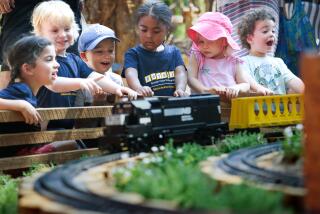Adult Toys Help to Keep Alive the Era of Iron Horse
Bill Coleman never leaves his Hacienda Heights home on Sunday mornings without hearing his wife’s gibes about his new-found hobby. “You’re playing with your toys again,” she tells him each time he heads for his car.
For almost a year of Sundays, Coleman has gone to Griffith Park to play with his toys in the company of friends. His toy is a gleaming, fully operational miniature replica of a diesel-powered locomotive. And his friends are the railroad buffs of the Los Angeles Live Steamers club, an order of men and women obsessed with building, maintaining and riding replicas of the great trains of locomotive lore.
Members of the club gather in Griffith Park every Sunday in a place given over to the past, a five-acre patch of land transformed into a miniature railroad line for the one-eighth-scale trains owned by Coleman and his friends. The Steamers’ kingdom comes complete with several miles of scaled-down tracks, hilly terrain, functional water towers, a ghost town and stations named after the club’s charter members.
Children Are Passengers
There are even passengers for the Steamers’ trains: Every Sunday, parents bring their children to the miniature railroad, to ride free and to learn a little about the vanished slice of Americana that the Steamers cherish.
“A well-functioning steam locomotive is one of God’s most wonderful works,” said Leo Maynard, a retired banker who is now the railroad site’s superintendent. “Unfortunately, it’s as dead as a dodo bird. What we’re hoping to do here is make sure that a few of these kids fall in love with it and maybe, as they get older, keep its memory alive.”
For now, the love affair is being conducted by a club dominated by middle-aged and elderly men--and a handful of women--who have the time, expertise and money to tend to the mechanical afflictions of miniature locomotives.
“These trains are like well-bred racehorses,” said Maynard, a youthful 69 compared to some of the club’s older members. “They’re sensitive, finicky, and for every hour they spend on the tracks, they spend another in the shop.”
But there is something romantic about the old trains--even if they are only an eighth the size of their historic counterparts--that keeps both the old men and the young children coming out to the park every Sunday.
Coleman, 54, a pollution control analyst, caught the railroad bug early in life. His father, a Southern Pacific railroad engineer, took him on runs in his steam-powered train when Coleman was a child. And he and his father often visited the Griffith Park site after the Live Steamers club formed and occupied the location in 1956.
In the club’s early days, there were less than two dozen members, including Walt Disney, who had operated his own model railroad on his San Fernando Valley estate, and songwriter David Rose. Another charter member was commercial artist Gordon L. Sherwood, now 74 and retired, who has a station at the park named after him and who owns two Live Steamers.
One train is a completed replica of a 1907 Atlantic steam locomotive. The other is an unfinished version of a Mogul freight locomotive, a train Sherwood built from scratch and on which he has been working for six years. In his Burbank home, Sherwood maintains an iron foundry and machine shop equipped with drill press and jeweler’s lathe just for his locomotive work.
“Young people raising families just don’t have the means to do this kind of thing,” he said.
Neither would Coleman, if his wife had her way. But when Coleman talks about his approaching retirement, he talks about trains.
Coleman would like to own a replica of a steam locomotive. But with the most inexpensive new models starting at $30,000, he was happy to find his diesel model for “the price of a new Toyota.”
Some members of the club would never deign to own a diesel. They call the newer trains “putt-putts” and “lawn mowers.”
“With all its efficiency, the diesel is totally lacking in romance,” Maynard said with a sniff.
Despite the gibes, the good-natured rivalry between the diesel men and the steam men is usually ignored when they open to the public on Sundays. On those days, they pool their resources and help each other work out the bugs in their locomotives, stoking engines, testing tenders, repairing damage caused by occasional derailments. When the trains are ready, the club members hop aboard to act as engineers for the wide-eyed children who wait at the station.
“That’s what makes this all worthwhile,” Gordon Sherwood said. “Most of these kids have never seen a steam locomotive before. You can bet that by the time they go home, they’re as crazy about these wonderful old things as we are.”
More to Read
Sign up for The Wild
We’ll help you find the best places to hike, bike and run, as well as the perfect silent spots for meditation and yoga.
You may occasionally receive promotional content from the Los Angeles Times.






